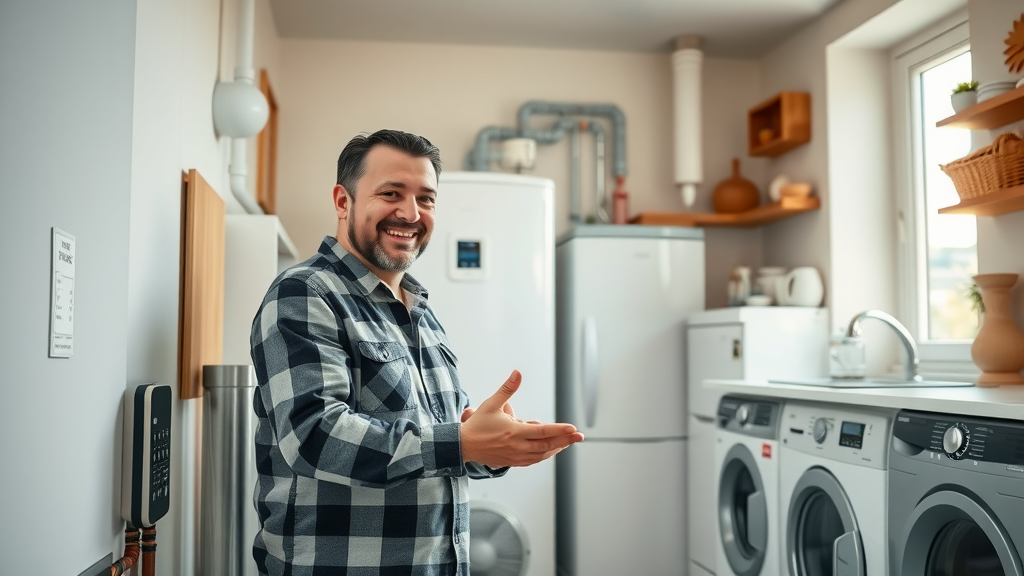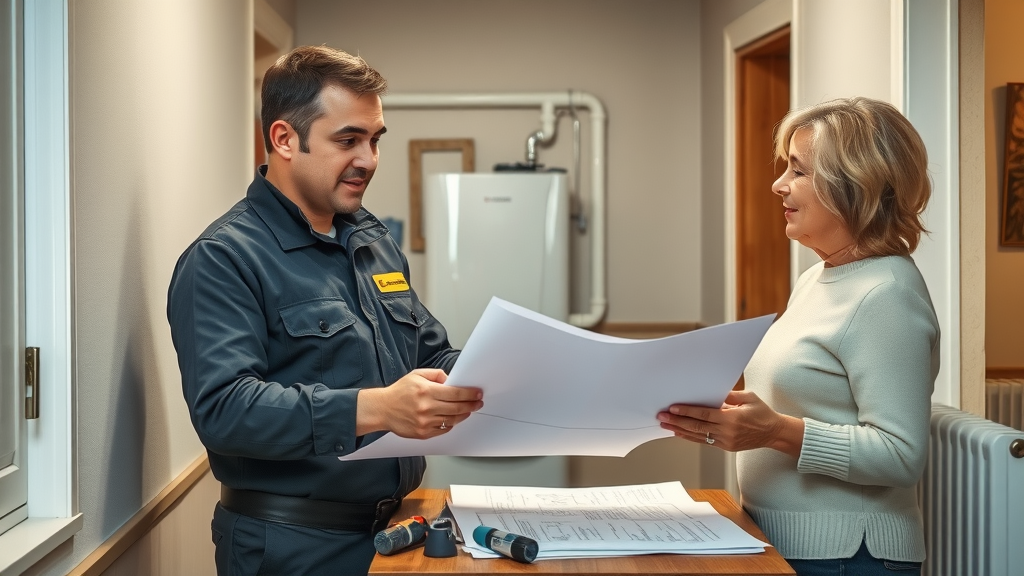Did you know over 80% of UK homes rely on boilers for home heating? With so many property owners dependent on their central heating system, choosing the right boiler type can dramatically impact comfort, energy bills, and even the value of your home. In this comprehensive guide, you’ll discover everything from popular boiler types and fuel options to installation tips, cost breakdowns, and real customer experiences—helping you find your perfect home heating solution .
Did You Know? Over 80% of UK homes rely on boilers for home heating
Understanding Boilers For Home Heating—A Foundational Overview
Boilers for home heating have been the backbone of British comfort for decades. A modern central heating system efficiently distributes warmth throughout the home, providing consistent temperatures and a reliable supply of hot water. Unlike older heating systems, today’s boilers for home heating come in several types, each engineered for specific property sizes and water demands.
Understanding the main types of boiler—combi, system, conventional, and condensing—can help homeowners select the most suitable option for their lifestyle. Whether you’re fitting a new combi boiler in a city flat, upgrading to a system boiler for a large home, or considering a conventional boiler for an older property, knowing your options is the key to maximising efficiency and comfort. Read on to uncover how your choice of boiler type can affect daily life—and your wallet.

Why the Right Boilers For Home Heating Matter for Energy Bills and Comfort
Impact of Boiler Type on Household Running Costs
The boiler type you choose has a significant impact on your household running costs . Advanced condensing boilers can achieve efficiencies of up to 90%, helping homeowners reduce their annual energy spend by hundreds of pounds compared to older models, which are often less than 70% efficient. Gas boilers remain the most cost-effective option for many, thanks to the UK’s wide gas grid.
Combining the right boiler with proper controls and insulation means your central heating works smarter, not harder. This not only cuts bills but also lessens environmental impact. Whether you select a combi boiler for instant hot water or a system boiler for greater supply, matching the boiler to your household’s specific needs ensures you aren’t paying for wasted energy or insufficient heating.
Boilers For Home Heating: Increasing Home Value with New Boiler Installations
A new boiler install does more than deliver warmth—it can actually increase your property’s value . Modern, high-efficiency boilers signal to buyers that a home has been maintained and updated for comfort and efficiency, making it a more attractive purchase. Newer combi or system boilers with smart controls are in high demand, especially in areas where energy bills are a top concern.
Potential buyers are likely to notice the benefits of a well-maintained heating system, including reduced running costs, reliability, and eco-friendly operation. As energy efficiency becomes an even greater selling point in the UK housing market, upgrading your home’s heating system can provide strong returns not only in cost savings but also in long-term property value.
Core Boiler Types: Exploring Options for Homeowners
Combi Boilers: Compact Solutions for Hot Water and Heating
Combi boilers (combination boilers) are the most popular choice for UK households seeking convenience and efficiency . With no need for a separate hot water cylinder or storage tank, combi boilers are ideal for smaller homes, flats, or anywhere space is at a premium. They deliver instant heating and hot water directly from the mains, ensuring your showers, baths, and sinks always have hot water on demand—perfect for households with one bathroom.
-
No hot water cylinder required
-
Energy-efficient performance
-
Popular for boiler install in flats and smaller houses
System Boilers: Perfect for Larger Households or Multiple Bathrooms
For homes with higher hot water demands —such as those with multiple bathrooms—a system boiler is often the best solution. System boilers use a separate hot water cylinder but integrate key components for easier installation and operation. They provide consistent hot water to several taps at once , making them a smart choice for busy families or households where simultaneous showers, baths, and washing-up are the norm.
-
Delivers hot water to several taps at once
-
Common for new boiler upgrades in larger homes
-
Streamlined boiler install due to integrated components

Conventional Boilers: Traditional Heating System for Older Properties
Conventional boilers, sometimes called regular or heat-only boilers, are the traditional option, especially for older UK properties with existing central heating infrastructure. They require both a hot water cylinder (often installed in the airing cupboard) and a cold-water tank in the loft. Because they are designed to handle high heating and hot water needs, conventional boilers are a reliable choice for large family homes with a legacy heating system or properties with several radiators and high water usage.
-
Feeds central heating and hot water demand
-
Ideal when replacing old heating system setups
-
Suited for homes with high hot water requirements
Condensing Boilers: Maximising Efficiency for Home Heating
By law, all new boilers installed in the UK must be condensing boilers . These units reclaim heat from exhaust gases that would otherwise be wasted, dramatically improving the overall energy efficiency of your heating system . Condensing models come in all main types of boiler : combi, system, and conventional.
-
Up to 90% efficient compared to less than 70% for older models
-
Required by law for most new boiler installs
-
Options available for gas boiler, oil, and system boilers
Boilers For Home Heating Fuel Types: Gas Boiler, Oil, Electric & More
Gas Boilers—The UK’s Most Popular Heating System
Gas boilers dominate the UK market, and for good reason: they’re cost-effective, efficient, and supported by the widespread national gas grid. Modern gas combi boilers or system boilers are both highly efficient and compact, ideal for everything from small flats to spacious detached homes. A boiler service is typically straightforward for gas units, ensuring low maintenance and reliable hot water delivery all year round.

Oil Boilers—The Solution for Off-Grid Homes
Properties not connected to the mains gas grid—often rural homes—opt for oil boilers . These run on stored heating oil and work similarly to their gas-powered cousins. Modern oil boilers are built for energy efficiency and can be paired with system or conventional boiler setups to meet substantial heating and hot water needs. If you have sufficient outdoor space for an oil tank, this is a reliable way to keep your home comfortably heated off-grid.
Electric Boilers—Eco-Friendly and Low Maintenance
Electric boilers are a growing option for eco-conscious or urban homeowners. With no need for combustion, they’re quiet, compact, and require minimal maintenance—ideal for flats or small homes without a gas supply. Paired with renewable sources like solar panels, electric boilers can provide a low-carbon heating solution, though running costs may be higher than gas systems unless you have access to cheaper electricity or storage tariffs.

Exploring Heat Pumps as an Alternative to Boilers For Home Heating
As the UK seeks to achieve climate goals, heat pumps have emerged as an alternative to traditional boilers for home heating. Air source or ground source heat pumps work by extracting heat from outside air or the ground, offering low-carbon home heating and hot water. While their upfront costs can be higher, government incentives and lower running costs make them an attractive long-term solution for eco-minded households planning a major heating system upgrade .
Keep in mind, heat pumps may require changes to your radiators or insulation for best performance, and they work especially well in new builds or well-insulated homes.
Comparing Boiler For Home Heating Brands and Models
Worcester Bosch, Vaillant, Ideal: Industry Leaders for Boilers For Home Heating
Leading brands, such as Worcester Bosch , Vaillant , and Ideal , set the gold standard for reliability and efficiency in the UK home heating market. These manufacturers offer a range of boiler types and models, allowing you to select a boiler tailored to your property’s size and hot water needs. Newer models come with advanced smart controls, extended warranties, and impressive efficiency scores, making them a wise investment for cost-conscious homeowners aiming to reduce their carbon footprint and increase comfort.
Comparison of Top Boilers for Home Heating
|
Brand |
Boiler Type |
Efficiency |
Price Range |
|---|---|---|---|
|
Worcester Bosch |
Combi/System |
93% |
£900–£2,500 |
|
Vaillant |
Combi/System |
92% |
£850–£2,300 |
|
Ideal |
Combi/System |
91% |
£700–£2,000 |

Essential Features: What to Look For In Boilers For Home Heating
Key Factors: Efficiency, Warranty and Smart Controls
When choosing from the various types of boilers , prioritise energy efficiency ratings—look for the highest possible percentage and condensing technology. A long manufacturer warranty offers peace of mind and coverage for parts or labour, especially when buying from brands like Worcester Bosch or Vaillant. Modern boilers also offer smart controls, letting you tailor heating schedules, control temperature remotely, and monitor energy usage for additional savings.
Sizing Your Boiler to Suit Your Unique Heating System
Correctly sizing your boiler for home heating is essential for optimal performance and efficiency. An oversized boiler can lead to wasted energy and higher bills, while an undersized one might struggle on cold days. The most important factors are property size, insulation level, and the number of radiators and bathrooms. Consult a Gas Safe heating engineer, who can calculate the required boiler output (measured in kilowatts, kW) and recommend the best boiler type for your specific needs.
Hot Water Needs: Matching Boiler Type With Daily Lifestyle
Consider your household’s hot water usage when selecting a new boiler. For smaller households with one bathroom and lower hot water demands, a combi boiler is convenient and space-saving. Large families, busy mornings, or homes with multiple bathrooms benefit from a system boiler or a conventional boiler, with a cylinder to store hot water and ensure consistent supply throughout the day—even during peak times.
Boiler Installation: Professional Fitting For Boilers For Home Heating
The Boiler Install Process: What To Expect
A professional boiler installation is key to ensuring safe, efficient, and long-lasting home heating. The process typically begins with a site survey, followed by the removal of the old boiler and installation of the new unit, including system flushing and setup of controls. Gas Safe registered engineers handle all aspects, ensuring compliance with UK safety standards and optimal operation from day one.
How To Prepare Your Home For A New Boiler Installation
-
Clear access to old boiler or location
-
Arrange for pets and children to be safely elsewhere
-
Understand boiler service timetables

Boiler Install Costs: Budget Considerations
Budget plays a crucial role when planning a new boiler . Prices vary based on the boiler type (combi, system, conventional), the complexity of installation, and any necessary upgrades to your heating system. Always request fixed quotes from certified installers and check what’s included, such as removal of an old system, new controls, or additional pipework.
Ongoing Care: Boiler Service, Maintenance, and Legislation
Boiler Service Requirements and Best Practices
Regular annual boiler service is critical for safety, efficiency, and warranty validity. Gas Safe engineers perform a comprehensive check of combustion, pressure, and system controls, and identify any early signs of wear or faults. Always use a registered professional to ensure compliance with UK regulations and avoid voiding your warranty.
Common Boiler Faults and When to Call a Professional
-
Unusual noises from combi boilers
-
Loss of pressure in heating system
-
Hot water issues or lack of heat
Any consistent issues—such as cold radiators, water leaks, or error codes—should prompt a call to a qualified technician. Prompt response can often spare you expensive repairs and keep your central heating running efficiently.
Boiler Legislation: Safety and Energy Efficiency
All new boiler installs in the UK must meet strict safety and energy efficiency standards. Condensing technology is now mandatory, and all gas work must be carried out by Gas Safe registered professionals. Homeowners are obliged to keep records of boiler service and installation certificates, especially for insurance or when selling the property.
Costs and Pricing for Boilers For Home Heating
Breaking Down the Cost of New Boiler and Fitting
Estimated Boiler For Home Heating Price Guide
|
Boiler Type |
Supply Only (£) |
Installed (£) |
|---|---|---|
|
Combi Boiler |
700–1,800 |
1,800–3,300 |
|
System Boiler |
900–2,100 |
2,000–3,800 |
|
Conventional Boiler |
800–1,650 |
1,900–3,300 |
Cutting Energy Bills With Efficient Boilers For Home Heating
Upgrading to an energy-efficient new boiler (such as an A-rated condensing boiler) can help homeowners slash annual heating bills by up to 30%. The initial investment is quickly recouped thanks to lower gas, oil, or electricity usage—plus greater comfort all round. Using smart controls and regular boiler service maximises these savings further.
People Also Ask
What is the average cost of a boiler replacement?
The average cost for boiler replacement in the UK ranges from £1,800 to £3,500 when including installation. Prices vary based on the type of boiler (combi, system, or conventional), property size, and additional features such as smart controls or new radiators. Always obtain multiple quotes from Gas Safe installers to ensure value and transparency.
What is the best boiler for heating?
The best boiler for heating depends on your property size and hot water needs. For small homes or flats, a combi boiler is ideal; for larger homes or those with high hot water demand, consider a system boiler or a conventional boiler. Brands such as Worcester Bosch and Vaillant consistently rank highly for reliability, efficiency, and customer satisfaction.
How much does it cost to have a new boiler fitted?
Fitting a new boiler , including installation by a qualified engineer, typically costs between £1,800 and £3,800 , depending on factors like property size, existing system, and chosen boiler type. The cost includes labour, removal of the old unit, and sometimes additional upgrades like new controls or pipework.
Should I replace my 20 year old boiler?
Yes, replacing a 20 year old boiler is advisable. Older units are less efficient, more likely to fail, and may even pose safety or carbon monoxide risks. Modern condensing boilers are up to 90% efficient, cut energy bills, and provide enhanced comfort and reliability. Plus, new systems come with better controls and extended warranties.
Customer Reviews and Real-Life Experiences With Boilers For Home Heating
"Installing a Worcester Bosch combi boiler halved my heating bills and now I have instant hot water all year round" – Homeowner, London
"Our new system boiler handles hot water for three bathrooms without issues, even in winter" – Family, Manchester
FAQs About Boilers For Home Heating
How often should boilers for home heating be serviced?
Boilers for home heating should be serviced at least once a year by a Gas Safe registered engineer. Annual servicing maintains efficiency, prolongs lifespan, and ensures that your heating system is safe and compliant with UK regulations.
Which boiler type suits a small flat?
For a small flat with limited space and moderate hot water demands, a combi boiler is typically the best choice. They’re compact, eliminate the need for a storage tank, and deliver hot water on demand—perfect for single-bathroom properties.
Can I switch from a conventional boiler to a combi or system boiler?
Yes, many homeowners upgrade from a conventional boiler to a combi or system boiler to save space and improve efficiency. However, this process may involve additional pipework, cylinder removal, or electrical upgrades. Always consult a heating professional to assess feasibility and costs.
Is a gas boiler still allowed after 2025?
Current plans focus on restricting gas boiler installations in new-build homes from 2025 onwards. Existing homes can still replace or install new gas boilers, but renewable alternatives (like heat pumps) are being encouraged for future-proofing and sustainability.
Key Considerations Before You Buy Boilers For Home Heating
-
Match boiler type to hot water needs and household size
-
Compare efficiency ratings
-
Check manufacturer warranties
-
Ensure compliance with UK boiler legislation
-
Obtain quotes from Gas Safe installers
Video: Combi Boilers vs System Boilers – Which Is Best For Your Home?
Explore combi vs system boiler features, advantages, and which may suit your property in this helpful video. (Video embed placeholder)
Video: Step-By-Step Boiler Installation Process
Watch an expert engineer guide you through a full boiler install from start to finish. (Video embed placeholder)
Summary Of Boilers For Home Heating - Making An Informed Choice
-
Modern boilers for home heating increase comfort and reduce costs
-
Combi, system, and condensing types fit a range of households
-
Always use a registered engineer for your new boiler install
Expert Guidance and Next Steps
Ready to upgrade your heating system or compare new boiler quotes? If you would like us to interview you as a subject expert for your business or organisation, email ai@dylbo.com to share your insights or arrange a consultation.
Sources
When considering the best heating solutions for your home, it’s essential to understand the various boiler types and their benefits. The article “Types of Boilers: A Complete Guide For Home Heating” provides a comprehensive overview, detailing options like combi, system, conventional, and condensing boilers, along with their respective advantages.
For a deeper dive into the benefits of residential boilers, the article “Benefits of Residential Boilers: Top Advantages & Efficiency Guide” highlights key advantages such as energy efficiency, consistent heating, and improved air quality. This resource can help you understand how different boiler types can enhance your home’s comfort and reduce energy costs.
Additionally, the “2025 Boiler Replacement Guide: Installation Costs, Types, Pros & Cons” offers valuable insights into the latest boiler technologies, installation considerations, and cost analyses. This guide is particularly useful for homeowners planning a boiler upgrade, providing detailed information to make informed decisions.
If you’re serious about optimizing your home’s heating system, these resources will equip you with the knowledge to choose the most suitable boiler type, understand the associated benefits, and navigate the installation process effectively.
 Add Row
Add Row  Add
Add 




Write A Comment